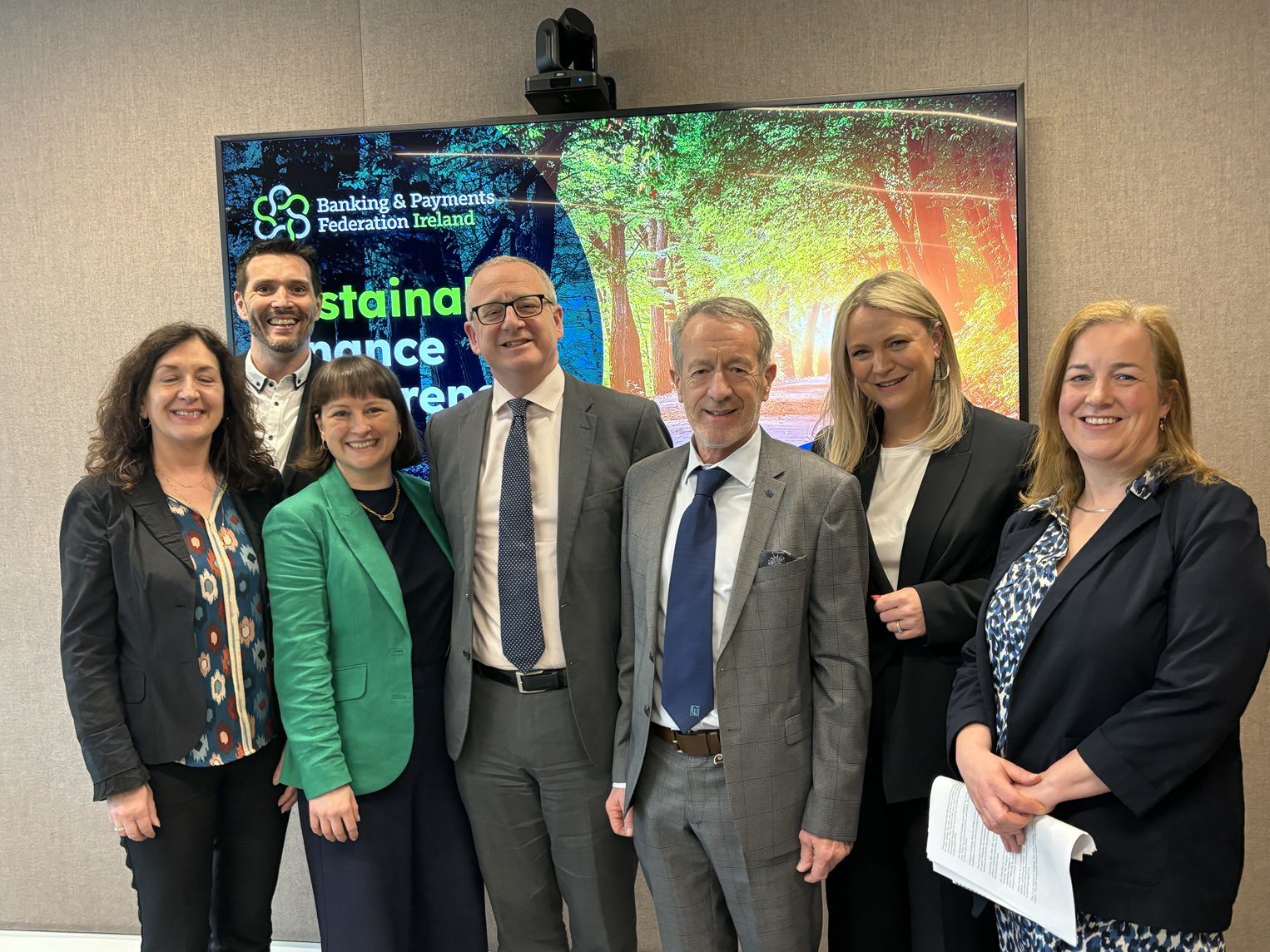Speech by BPFI CEO Brian Hayes at Climate Finance Week, COP26: Climate and the Race to Net Zero
Wednesday 13th October 2021 – Brian Hayes, Chief Executive, Banking & Payments Federation Ireland today addressed Climate Finance Week delegates outlining the critical role banks are playing in driving a carbon neutral future. His speech, delivered during today’s theme, COP26: Climate and the Race to Net Zero, highlighted the work the banking sector is undertaking to make Ireland’s ambitious climate targets a reality both internally by integrating ESG criteria into business and investment decisions and externally through the development and delivery of green products for households, SMEs and corporates:
“Colin Hunt couldn’t have been clearer on Monday in kicking off Climate Finance Week when he said – we have just 8 years between now and 2030 to make a difference. As we know, other countries are ahead of Ireland in the green transition. We are coming from behind. If we are going to hit our net zero targets by 2030 and by 2050 we have a huge mountain to climb.
Our industry, the banking industry, which remains the key financial intermediary in the formation of capital and investment for businesses and households, plays a critical role now in making the ambitious climate targets a reality. We are the people who can make sustainable investment happen, to help transition to a cleaner future and to help create the new jobs that will sustain our economy.
Every financial decision we take as a sector needs to take climate into account. I want to make it crystal clear that climate action is a key priority for BPFI, for our members and for the entire industry both here in Ireland and with our partners across the EU but especially with our colleagues in the European Banking Federation.
The banking industry is going through a remarkable period of change and adjustment right now. Big challenges are up ahead from digital to cyber to climate. The commitments made by our members on UN principles are real. They are not entered into lightly by banks who fully understand that words need to be matched by actions. These commitments will adapt bank business models and strategies for a generation.
The IMF has estimated that the climate transition in Ireland will need an investment annually in the order of about €20bn. That’s the view of the IMF. It has estimated that two thirds of this investment will come from the private market based and bank finance and about one third from the public sector. These are staggering amounts.
What is BPFI doing in the climate space?
Our most recent members survey found some really interesting things.
- 75% of members were actively involved in their group’s implementation of Sustainable Finance
- Over 50% see an opportunity for their Irish operations to take a global leadership role, especially so in new products and services and in regulatory and risk capabilities for the group out of Ireland,
- 37% of respondents are already involved in integrating climate risk planning,
- 72% saw opportunities in a three-year horizon,
Our survey clearly highlights big interest and a growing awareness across all of our members in the climate area.
The banking sector in Ireland is well placed to deliver on the sustainable finance agenda not only domestic banks but also the active presence of banks with European and global reach based in Ireland. We need to turn the advantages of being the 5th biggest financial service centre in Europe to the advantage of climate change at home and abroad. It’s the very presence of international and domestic SSM and LSI banks which can help shape the climate change finance story. Ireland is now becoming known as a green hub and our status as a major financial services centre in the EU can only help promote the skills and expertise that’s needed on climate change finance.
Throughout 2021 BPFI organised a successful Sustainable Finance Insight Series. Our workshops demonstrated the importance if the cross-functional focus on sustainability. Finance, risk, strategy, compliance, product development – all of these contribute to improving the awareness of our members and provoking the kind of ambition we all need to see. And as we know the upcoming ECB stress tests next year are so critical in identifying and managing climate risks in the portfolio of banks here and across the EU.
BPFI also sits on the SF Skillnet Committee and we value the opportunity to work with Skillnet and others to build on the training and skills crucial for financial professionals.
What are banks doing right now in developing their products and services.
Banks, as intermediaries and advisors, are today helping to finance the transition to a carbon neutral future. In policy term the banking industry is central in delivering on EU & national climate objectives.
We do this by helping SMEs and corporates adapt their business models to go green and to find efficiencies in their supply chain. Banks support companies to structure green social sustainability, help in the production of green products, conduct ESG due diligence for M&A and private equity transactions, stress test clients’ ESG strategy, work on disclosures, risk ratings, provide sector-specific advisory on ESG risks and market standards – it’s a comprehensive list.
Indeed, both our international and domestic banks are well on the way in the design and delivery of green products for households, SMEs and corporates.
Recent successful green bond frameworks issued by banks as well as green loans prompts sustainability via the financing of renewable energy, sustainable water management, green buildings, climate change adaptation in addition to supporting projects such as clean public transportation or energy efficient social housing.
This week alone we saw AIB double its climate action fund to €10 billion and we learned that TD Securities is a Lead Bank Manager for EU’s first green bond with a 15-year maturity to raise €12bn. This is the largest green bond ever issued which was announced on Tuesday. That’s happening in Dublin for the entire EU!
Financing Energy Efficiency
On the domestic front our members are developing more green products, such as green mortgages, savings and investment products, e-car and home financing, in response to investor and client demand.
And in the retrofitting and new homes mortgage space lenders offer considerable discounts on mortgage and unsecured loans where the customers seek to improve the energy efficiency of a property. BPFI welcomes recent NDP commitments: €1.3 billion ring-fenced from carbon tax receipts for national retrofitting plans out to 2025, with additional funds each year. This will support the government’s target of retrofitting 500,000 homes to a Building Energy Rating of B2 and the installation of 600,000 heat pumps, of which 400,000 which will be in existing homes by 2030.
Interaction with government – SF Roadmap
BPFI was delighted to participate in the development of the Sustainable Finance Roadmap. This roadmap, launched by Minister Donohoe on Monday, with the ambition of enabling Ireland to become a leading hub for sustainable finances, provides the framework for progress on key areas such as skills, innovation, access to data. The entire sector needs collaboration with Government and with our regulator – it’s a crucial partnership if we are going to make the transition a success.
ENDS/
Contact: Jillian Heffernan, Head of Communications, 087 9016880 or jillian.heffernan@bpfi.ie
About BPFI: Banking & Payments Federation Ireland (BPFI) represents the banking, payments and fintech sector in Ireland. Together with its affiliates, the Federation of International Banks in Ireland, and the Fintech & Payments Association of Ireland, BPFI has 100 member institutions and associates, including licensed domestic and foreign banks and institutions operating in the financial marketplace here.







